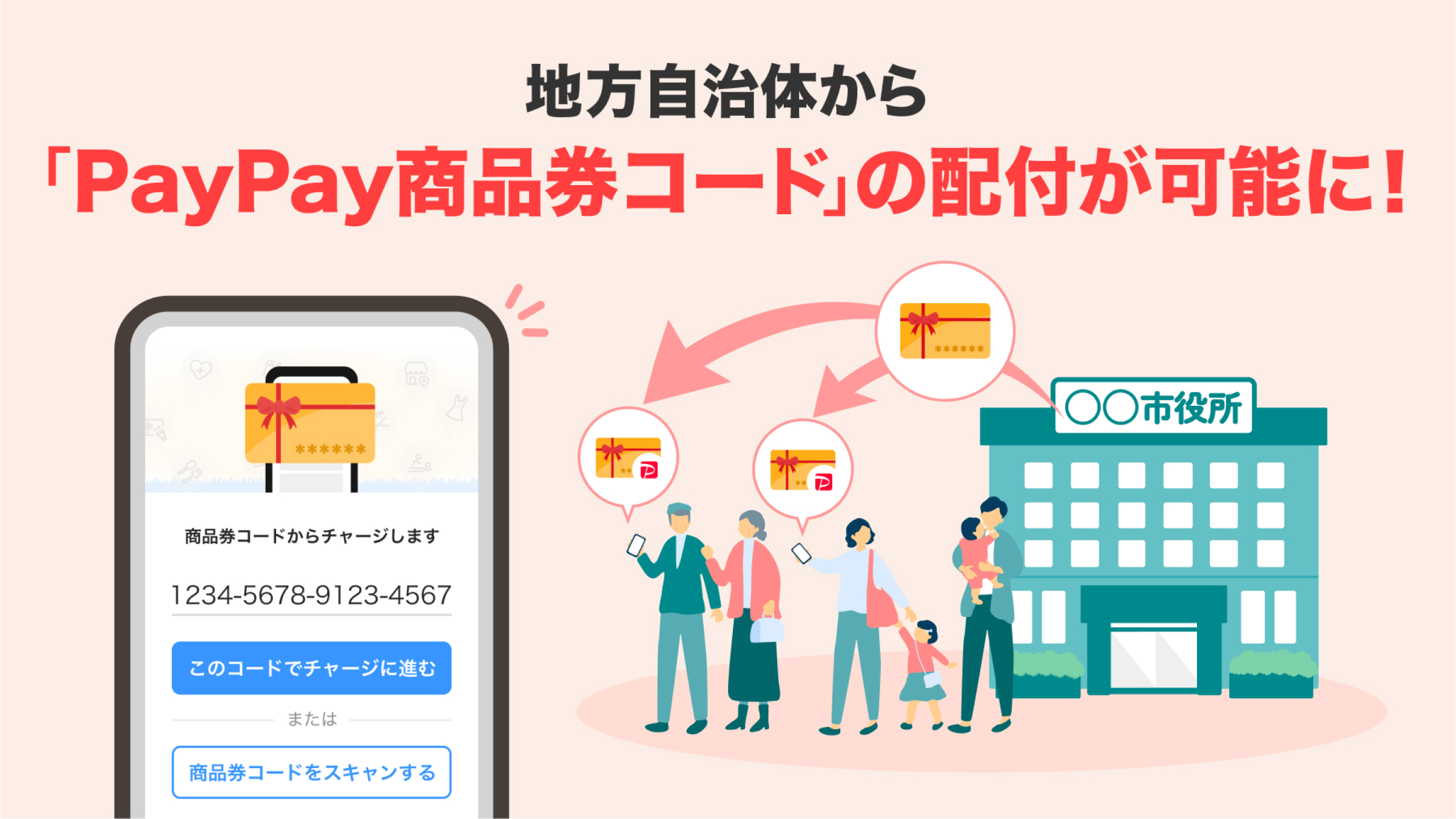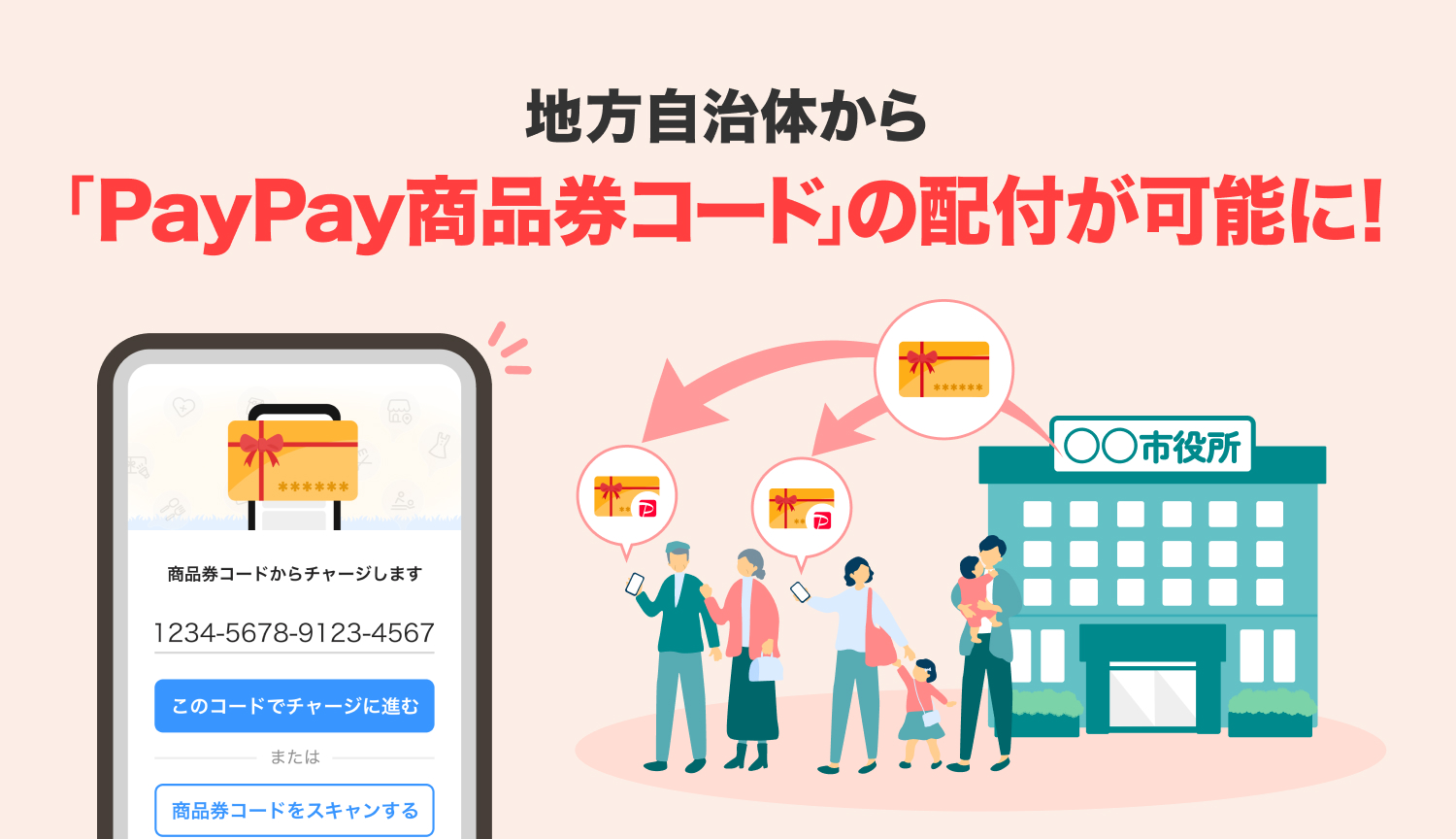PayPay Corporation (hereinafter “PayPay”) is pleased to announce that local governments can now distribute “PayPay Gift Voucher Codes,” which give users access to the “PayPay Gift Vouchers”*1 that the local governments issue. This feature allows for greater flexibility for local governments to use PayPay Gift Vouchers in their municipality-specific promotions.
Users who receive a PayPay Gift Voucher Code distributed by their local government can scan or input the code in the PayPay app. This allows them to purchase or receive a “PayPay Gift Voucher,” which can then be used for payments at PayPay merchants specified by the local government.
*1. PayPay Gift Vouchers are a payment method within PayPay with a set expiration date and can only be used at specific merchants.
Additionally, Nishiwaki City in Hyogo Prefecture is the first local government to utilize the new PayPay Gift Voucher Codes. It will begin using them for PayPay Gift Vouchers sold as part of the city’s childcare support premium gift voucher program, which will be available for purchase and use from July 25, 2025.


Since becoming available in September 2023 as a way for municipalities to issue premium gift vouchers, PayPay Gift Vouchers have been adopted by many local governments. Users can smoothly apply for and purchase their desired gift vouchers through the PayPay app. Municipalities have praised the system for the ease with which they can conduct residency checks on applicants using the identity verification (eKYC) information provided by PayPay, leading to a swifter implementation of their initiatives.
At the same time, some municipalities considering the use of this service have requested the ability to select recipients based on unique criteria other than address, depending on the purpose of their initiative. The PayPay Gift Voucher Code is advantageous as it allows municipalities to distribute codes supplied by PayPay directly, enabling a broader range of initiatives. Municipalities can select recipients based on unique criteria specific to their initiative’s objectives, distribute the PayPay Gift Voucher Code to the recipients, and have them use it as a PayPay Gift Voucher.
Furthermore, PayPay Gift Vouchers can be allocated to users via PayPay Gift Voucher Codes in two ways: a “for Purchase” option, suitable for premium gift vouchers, and a “for Receipt” option. The “for Receipt” option is easy to use for subsidy programs such as childbirth and child-rearing allowances, accommodation benefits, and relocation incentives.
Furthermore, the allocation of PayPay Gift Vouchers to users through the PayPay Gift Voucher Code not only supports “purchases” of premium gift vouchers but also offers a “receipt” option that is easy to use for subsidy programs such as childbirth and child-rearing allowances, accommodation benefits, and relocation incentives.
| PayPay Gift Vouchers | |||
|---|---|---|---|
| Type:
*Excluding Satofull’s hometown tax donation |
New: Gift Voucher Code (For purchases*2) |
New: Gift Voucher Code (For receipt*3) |
Application via PayPay app *For purchase only |
| Selection and Evaluation of Recipients: | Evaluation and selection based on municipal information and conditions | Selection and evaluation based on PayPay identity verification (eKYC) information | |
| Examples of Use: | Premium Gift Vouchers | Benefit Programs | Premium Gift Vouchers |
| Implementing Municipalities:
*As of July 25, including both implemented and planned |
・Nishiwaki City, Hyogo Prefecture ・Kofu City, Yamanashi Prefecture ・Hyuga City, Miyazaki Prefecture ・Gyoda City, Saitama Prefecture ・Yuki City, Ibaraki Prefecture |
・Izumi Otsu City, Osaka Prefecture | 54 municipalities |
*2. Users who receive a “for Purchase” PayPay Gift Voucher Code can enter the code and purchase a PayPay Gift Voucher for a specified amount on PayPay. They will receive a voucher whose value includes the premium added by the municipality on top of the purchase amount.
*3. Users who receive a “for Receipt” PayPay Gift Voucher Code can enter the code to receive a PayPay Gift Voucher for the amount set by the municipality.
Since July 2020, PayPay has been actively utilized by numerous municipalities nationwide, including campaigns as part of PayPay’s “Support Your Town Project” which has been implemented in collaboration with 476 municipalities across 46 prefectures*4. The provision of PayPay Gift Voucher Codes, which expands the functionality of PayPay Gift Vouchers, is part of PayPay’s initiative to support regional economic revitalization and digital transformation (DX) for municipalities on its platform.
Municipal officials interested in introducing newly launched services for local governments, including PayPay Gift Voucher Codes, can make inquiries through our solutions and services portal for municipalities.
PayPay will continue to leverage its platform, used by over 70 million people nationwide*5, to support regional economies and DX for municipalities. The company will do this by introducing new features and services that meet the needs of local governments while continuing to build a safe and secure environment for our users.
*4. As of July 15, 2025
*5. As of July 15, 2025
■About PayPay Gift Vouchers:
PayPay Gift Vouchers are a payment method issued by PayPay, with limited validity and usage scope.
They can currently be obtained through the following methods:
・As vouchers distributed or sold through initiatives by various local governments.
・As a gift in return for hometown tax donations via the Satofull platform.
PayPay Corporation is registered as follows:
・Prepaid Payment Instruments (third party type) Issuer (Registration number: Director-General of the Kanto Finance Bureau, No. 00710 / Registration date: October 5, 2018)
・Business Operator that Concludes Contracts on the Handling of Credit Cards (Registration number: Kanto (Ku) No. 106 / Registration date: July 1, 2019)
・Telecommunications Carrier (Filing number: A-02-17943 / Date filed: July 2, 2019)
・Fund Transfer Operator (Registration number: Director-General of the Kanto Finance Bureau, No. 00068 / Registration date: September 25, 2019)
・Bank Agency Services (License: Director-General of the Kanto Finance Bureau (Gindai) No. 396 / Registration date: November 26, 2020)
・Financial Instruments Intermediary Services (Registration number: Kanto Finance Bureau Director (Kinchu) No. 942 / Registration date: June 25, 2021)
・Electronic Payment Agency Services (License: Director-General of the Kanto Finance Bureau (Dendai) No. 109 / Registration date: February 14, 2023)
・Designated Funds Transfer Operator, permitted to provide digital payment of wages(Designation No.: Minister of Health, Labor and Welfare No. 00001 / Date of designation: August 9, 2024)
・Japan Payment Service Association (https://www.s-kessai.jp/, Date of admission: September 12, 2018)
・Japan Consumer Credit Association (https://www.j-credit.or.jp/, Date of admission: July 1, 2019)
* “PayPay” offers four types of electronic money and other services: PayPay Money, PayPay Money Lite, PayPay Points, and PayPay Gift Vouchers.
PayPay Money can be used to pay for partner services and merchants if it is within the amount deposited into the PayPay account opened after completing an identity verification process. It can also be used for sending and receiving money between PayPay users free of charge. PayPay Money can also be cashed out to a designated bank account (no withdrawal fee if using PayPay Bank). The legal nature of this is an electromagnetic record which can be used to pay for goods and services, can be remitted or cashed out, and is issued by PayPay who is a Fund Transfer Operator registered under Article 37 of the Payment Services Act. PayPay Money (Paycheck) refers to PayPay Money that can only be purchased with wages received by the PayPay user in their Paycheck Account. Based on the provisions of Article 43 of the Payment Services Act, PayPay protects the debt it owes to its users by depositing assets equivalent to or higher than the debt amount. PayPay Money Lite is an electronic money issued by PayPay, which can be purchased and used to pay for services and merchants. PayPay users can transfer and receive PayPay Money Lite free of charge. The legal nature of this is a prepaid payment instrument issued by PayPay (Article 3, Paragraph 1 of the Payment Services Act). Based on the provisions of Article 14 of the Payment Services Act, PayPay preserves the relevant assets for the purpose of protecting the owners of the prepaid payment instrument by providing a security deposit for issuance to the Legal Affairs Bureau in an amount that is half or more of the unused balance of prepaid instrument methods as of March 31 and September 30. Until the customer’s identity verification is completed, issued PayPay Money Lite (including previously issued ones) is distinguished as PayPay Money Lite (Low Value), and for those customers who have completed identity verification (including previously issued ones), it is classified as PayPay Money Lite (High Value). In addition, PayPay Points, which are granted through campaigns and promotions when using PayPay, can be used for partner services and in transactions at merchants in addition to PayPay Money and PayPay Money Lite. However, it cannot be transferred to other users or cashed out. PayPay Gift Voucher is a type of electronic money issued by PayPay, which can be used to make payments for affiliated services and merchants designated by the PayPay Gift Voucher. However, it cannot be transferred to other users or cashed out. PayPay Gift Vouchers have an expiration date, after which they will no longer be valid. The deadline for Gift Vouchers can be confirmed in the details or specifications of the measure or promotion campaigns for which they are issued.
PayPay also strives to create a safe and secure environment for users. If an unexpected payment is made by a third party using a PayPay account, or if a request to settle a payment suddenly arrives from PayPay to a user that does not have a PayPay account, there is a scheme that ensures compensation for the damages suffered (the difference will be provided as compensation if compensation is also provided by a third party), given that the prescribed conditions are met. Please see “Applying for compensation” for details.
*The images are for illustrative purposes only.
*Company names, trade names, and product/service names mentioned in this press release are registered trademarks or trademarks of their respective companies.





